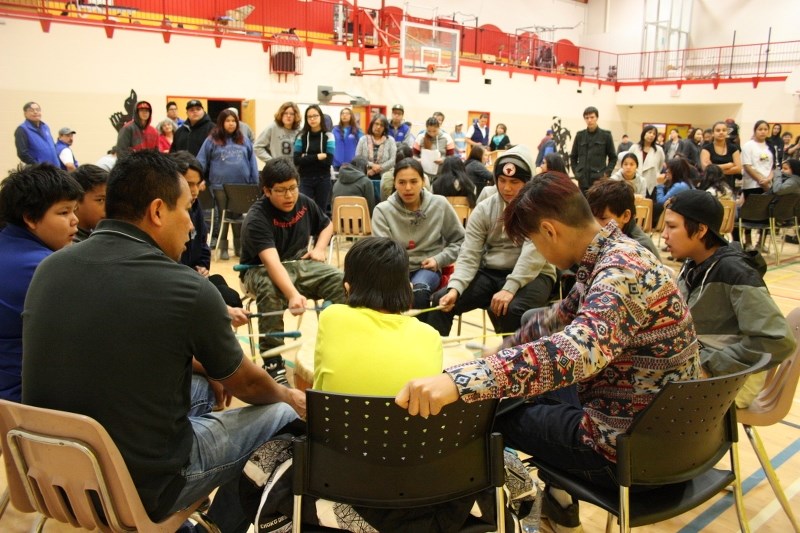While stories of grief and loss were shared at the Hope Day 2015 gathering in Kihew Asiniy, there were also words of support and love given to the students of the Saddle Lake high school, reminding them they were not alone and to be good to one another.
“Suicide is a tragic, traumatizing thing to go through,” said Hope Day organizer Sharon Quinney, who lost a daughter to suicide. She explained the day was not meant to make students sad, but to give them a chance to share, to grieve and to remind them there are ways to cope and live following a loss.
“There’s always hope – hope for a new tomorrow, a new beginning.”
Principal Linda Petrie noted she has spent a lot of time teaching and working alongside students, and caring for them.
“Unfortunately, I’ve had to bury a lot of students for a lot of years – I worry about all of you. I think of you. I love you all. I need you to remember that someone loves you, no matter what,” Petrie said, urging them to listen and take in the day’s stories. “I hope that everyone has something they take away from today, that they’ve heard, that they’ve taken into their heart.”
Elder Louis Lapatack gave a father’s account of suicide, something he said he still doesn’t like to talk about.
“As I said, this is a touching subject for me. I may break,” he said, putting his head down on the stand for a few minutes before collecting himself to speak.
Most of the crowd knew his daughter, who attended the school in Grade 9 or 10, he said.
“Problems arose. She couldn’t cope with the children,” he said, adding his wife made arrangements for her to live with her grandparents and attend a specialized program in Bonnyville. But she came to have a “sickness” known in the culture as one where a person turns cold; that no matter what one tries, he or she can not get warm.
“It affected her mind. Ever since then, her frame of mind, her thoughts changed – this is my theory,” he said, adding his daughter would sit in her room and spirits would come to her, and she would tell him the stories, referring to these spirits as her “friends.”
He and his wife took her to St. Paul for mental health treatments, but his daughter continued to struggle with depression.
On the advice of a brother and friend, Lapatack went to see a medicine man to find out how to help his daughter.
“He said, ‘You’ll see an eagle in the sky. When you see him fly away, you’re going to see life.’”
This pronouncement didn’t make much sense to Lapatack at the time, and his visit to the medicine man, as well as the treatment she was receiving in St. Paul, failed to have an effect on his daughter’s state of mind.
“She was 16 when she took her life away,” he said, adding afterwards, he tried to come to grips with it, and understand how things could have gone so wrong for a happy girl who came from a good home. “Could I have done something? I don’t know.” And while he said he couldn’t know God’s mind, he said he felt “God is a very forgiving God.”
When he made his one last pass on his way to bury his daughter in Kehewin, he made a stop at their old house.
“An eagle was waiting by the tree, right by my house. That’s what the medicine man predicted,” he said. “I’ve come to understand, eagles help us – sometimes they say it’s a symbol of God.”
When the floor opened to take comments and thoughts from the crowd, teacher Melanie Quinn came to the front to describe her own brushes with loss and death. She told those gathered that her cousin died in a vehicle accident caused by a drunk driver. Afterwards, many of the girls that had bullied her cousin came and apologized to Quinn. By then, it was too late to give their apologies to the girl they had wronged.
“We can say things but what we do is much more powerful,” she said. While some people might complain about having to go to school, Quinn said “for me, I can honestly say that school saved my life. That’s why I’m here, teaching you what I teach you.”
She said she made it a point to say hello to every student she saw in the hallways, to acknowledge them, and urged them to be there in the same way for one another, rather than bullying, gossiping and hurting one another.
“The deaths still haven’t stopped, but all of us are here together in hope and love,” she said. “Let’s not wait until death to say something good to each other.”



